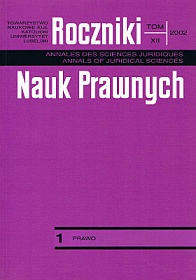Sąd Najwyższy Stanów Zjednoczonych pod prezesurą Johna Marshalla (1801-1835)
Abstrakt
The High Court in J. Marshall's time is associated, especially by non-American historians, mainly with its resolution of 1803 as regards Marbury v. Madison case. One should remember, however, that a great deal of resolutions from that period had played an enormous role in the actual formation of the political system of the state and society in the process of establishment. The Court chaired by Marshall for such a long time made key decisions, and the personal role of the chairman played a principal role. The significance of those resolutions and the unquestioned authority of Marshall had solidified the position of the High Court as a key institution of the American political system. Marshall became not only an ordinary guardian of the binding legal order, but also one of the greatest founders of law in history.
The quoted parts of the extremely rich activity of the High Court as regards its jurisdiction show a general illustration of J. Marshall's output. In fact, he became the actual founder of the United States as a federal state, in which a broadly-understood federal government plays an essential role. It has also grounded the concept of the American nation as a sovereign of the United States. Despite later tragedies of the Civil War, Marshall's output turned out to be so permanent that it survived the most difficult period in the history of the state, and then it became an inspiration and foundation for the leading role of the United States in the world. Marshall's output is referred to by American jurisprudence today as its most important source, and Marshall himself is regarded as the most prominent lawyer in American history. Most certainly, he occupies an eminent place among the greatest founders of law in the history of the world, although, paradoxically speaking, he never worked as a classical founder of law (legislator or codifier).
Copyright (c) 2002 Roczniki Nauk Prawnych

Utwór dostępny jest na licencji Creative Commons Uznanie autorstwa – Użycie niekomercyjne – Bez utworów zależnych 4.0 Międzynarodowe.


